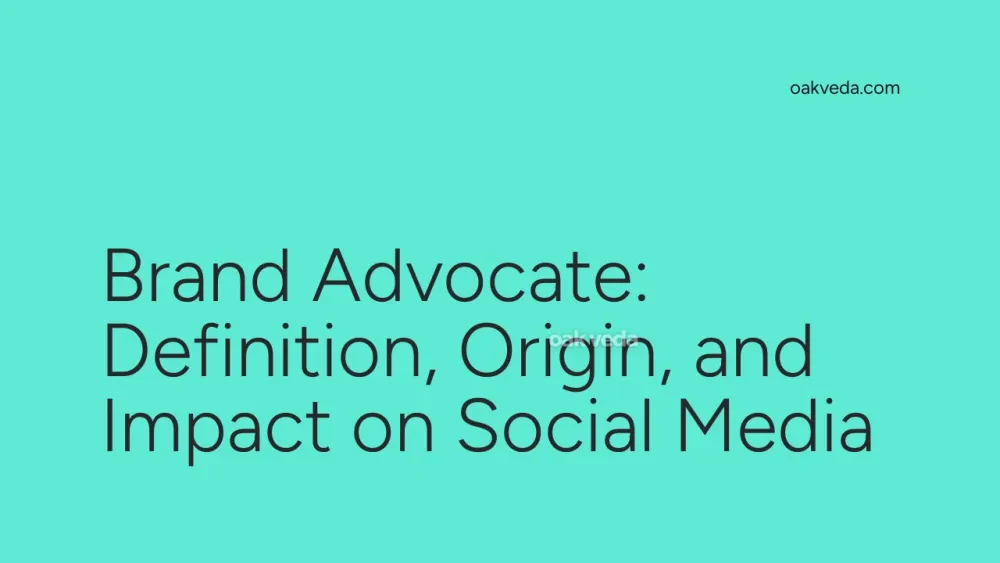
What is a Brand Advocate?
A brand advocate is an individual who actively supports, promotes, and recommends a particular brand or product through social media, word-of-mouth, or other channels. These passionate supporters are typically loyal customers who have had positive experiences with a brand and are eager to share their enthusiasm with others.
Origin and Development of Brand Advocacy
The concept of brand advocacy has existed long before the digital age, with satisfied customers recommending products to friends and family. However, the rise of social media platforms has significantly amplified the reach and impact of brand advocates. As social networks gained popularity in the early 2000s, businesses began to recognize the power of user-generated content and peer recommendations in shaping consumer behavior.
How Brand Advocacy Works
Brand advocacy works on the principle of social proof and trust. When a person shares their positive experiences with a brand, their friends, family, and followers are more likely to trust that recommendation than traditional advertising. This organic promotion can lead to:
- Increased brand awareness
- Improved brand perception
- Higher customer acquisition rates
- Enhanced customer loyalty
Brand advocates typically engage in activities such as:
- Sharing positive reviews and testimonials
- Creating and sharing user-generated content
- Recommending products or services to their network
- Defending the brand against criticism
- Participating in brand-related events and discussions
Types of Brand Advocates
There are several types of brand advocates, including:
- Natural Advocates: Customers who genuinely love the brand and promote it without any incentives.
- Incentivized Advocates: Customers who are encouraged to promote the brand through loyalty programs or rewards.
- Employee Advocates: Staff members who promote their company's products or services.
- Influencer Advocates: Social media influencers who partner with brands to promote their offerings.
Popular Examples of Brand Advocacy
Many successful brands have leveraged the power of brand advocates:
- Apple: The tech giant has a loyal following of customers who eagerly promote new products and defend the brand.
- Starbucks: Coffee enthusiasts often share photos of their Starbucks drinks on social media, acting as unofficial brand ambassadors.
- Nike: Athletes and fitness enthusiasts frequently showcase Nike products in their social media posts, contributing to the brand's visibility.
Impact of Brand Advocates on Social Media Culture
Brand advocates have significantly influenced social media culture by:
- Shaping Consumer Behavior: Peer recommendations often carry more weight than traditional advertising.
- Driving User-Generated Content: Advocates create authentic content that resonates with other consumers.
- Fostering Community: Brand advocates often form communities around shared interests and brand loyalty.
- Influencing Marketing Strategies: Companies now focus on cultivating and leveraging brand advocates as part of their marketing efforts.
Controversies Surrounding Brand Advocacy
While brand advocacy can be powerful, it's not without controversies:
- Authenticity Concerns: Some worry that incentivized advocacy may lead to inauthentic promotions.
- Disclosure Issues: There are ongoing debates about the need for advocates to disclose their relationship with brands.
- Over-Reliance: Some critics argue that brands may become too dependent on advocates, neglecting other marketing channels.
How Brands and Influencers Use Brand Advocacy
Brands leverage brand advocates through various strategies:
- Loyalty Programs: Rewarding customers for their advocacy efforts.
- User-Generated Content Campaigns: Encouraging customers to create and share content featuring the brand.
- Influencer Partnerships: Collaborating with influencers who align with the brand's values.
- Community Building: Creating spaces for advocates to connect and share experiences.
Influencers often become brand advocates themselves, using their platforms to promote products they genuinely believe in.
Future Trends in Brand Advocacy
As social media continues to evolve, so does brand advocacy. Some emerging trends include:
- Micro-Influencer Advocacy: Brands are focusing on individuals with smaller, highly engaged followings.
- AI-Powered Advocacy: Using artificial intelligence to identify and nurture potential brand advocates.
- Virtual and Augmented Reality Experiences: Creating immersive brand experiences that advocates can share.
- Blockchain-Based Loyalty Programs: Implementing transparent and secure reward systems for advocates.
FAQs about Brand Advocates
-
How do you become a brand advocate? To become a brand advocate, start by using and genuinely appreciating a brand's products or services. Engage with the brand on social media, share your experiences, and use relevant hashtags when posting about the brand.
-
Are brand advocates paid? Some brand advocates may receive incentives or rewards, but many promote brands simply because they love the products. It's important for any paid partnerships to be disclosed for transparency.
-
How can businesses identify potential brand advocates? Businesses can identify potential advocates by monitoring social media mentions, analyzing customer feedback, and looking for repeat customers who engage frequently with the brand.
-
What's the difference between a brand advocate and a brand ambassador? Brand advocates are typically unpaid customers who promote a brand organically, while brand ambassadors are often formally partnered with a brand and may receive compensation for their promotional efforts.
-
Can negative experiences create anti-brand advocates? Yes, customers who have had negative experiences can become vocal critics of a brand, potentially influencing others' perceptions negatively. This underscores the importance of maintaining quality customer experiences and addressing issues promptly.
In conclusion, brand advocates play a crucial role in modern marketing strategies, particularly on social media platforms. By harnessing the power of authentic, user-generated content and peer recommendations, businesses can significantly enhance their brand reputation and reach. As social media continues to evolve, the importance of cultivating and engaging brand advocates is likely to grow, making it an essential aspect of digital marketing strategies for years to come.
You may be interested in:
- SMART Goals: Definition, Origin, and Impact on Social Media
- IFYKYK: Definition, Origin, and Impact on Social Media
- Content Marketing: Definition, Origin, and Impact
- Sheesh: Definition, Origin, and Impact on Social Media
- Doomscrolling: Definition, Origin, and Impact
- Cottagecore: Definition, Origin, and Impact on Social Media

